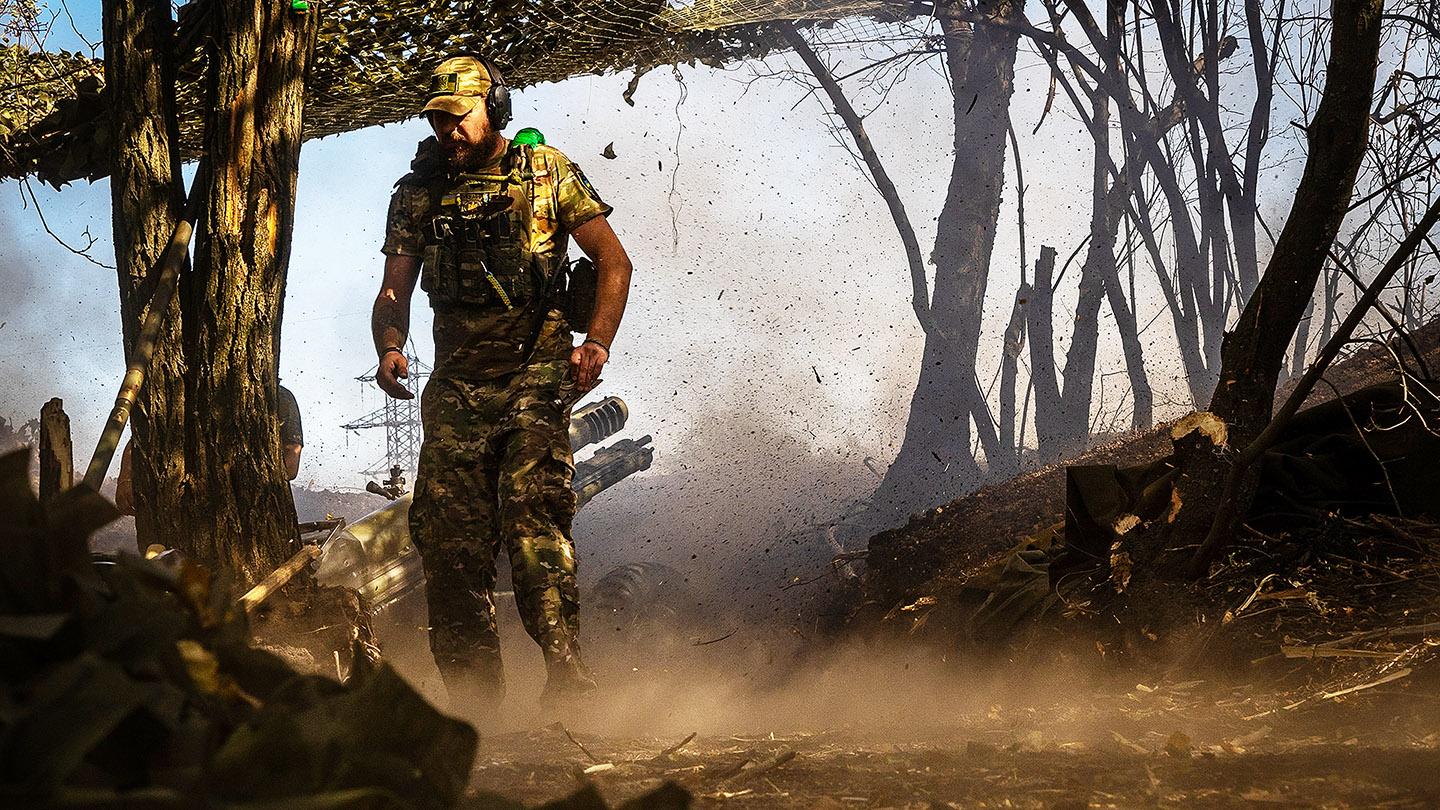Over the course of his presidency, Joe Biden vowed to back Ukraine for as long as it took to defeat Russia. So far, his administration has doled out over $61 billion in military aid to Kyiv, with scores of packages including advanced air defense systems and munitions, millions of artillery shells, hundreds of armored vehicles, and much more. President-elect Donald J. Trump has vowed a very different approach to how the U.S. will deal with the nearly three-year-old all-out war, raising concerns that he could abandon Ukraine.
On the campaign trail, Trump lambasted his predecessor’s approach, chiding Biden for providing arms free of charge. Above all else, Trump repeatedly touted his ability to quickly end the conflict, even if it means Ukraine conceding much of the nearly 20 percent of its territory Russia has captured going back to the annexation of Crimea in 2014. Moreover, Vice President-elect JD Vance has repeatedly expressed his disdain for the open-ended support to Ukraine, saying it should be greatly dialed back.
Trump, who was the first president to provide Ukraine with lethal aid in the form of FGM-148 Javelin advanced anti-tank missiles, has yet to provide details of his peace plan. However, it is reported that those close to him have ideas that include freezing the front lines as they are, and getting Ukraine to promise not to join NATO for at least 20 years in return for a promise to continue arming Ukraine to deter future Russian attacks, according to The Wall Street Journal.
“Under that plan, the front line would essentially lock in place and both sides would agree to an 800-mile demilitarized zone,” the publication proffered. “Who would police that territory remains unclear, but one adviser said the peacekeeping force wouldn’t involve American troops, nor come from a U.S.-funded international body, such as the United Nations.”
Despite these looming changes, some Ukrainians are hopeful about America’s new leadership. Even though the Biden administration is scrambling to ship over $6 billion remaining in Ukraine security assistance funds out the door by Inauguration Day, there is growing resentment about its slow delivery of arms and restrictions preventing long-range weapons from being used deep inside Russia. That anger is exacerbated by concerns that billions in new equipment won’t arrive before Trump takes office, raising questions about whether it might be cut off under a new administration.
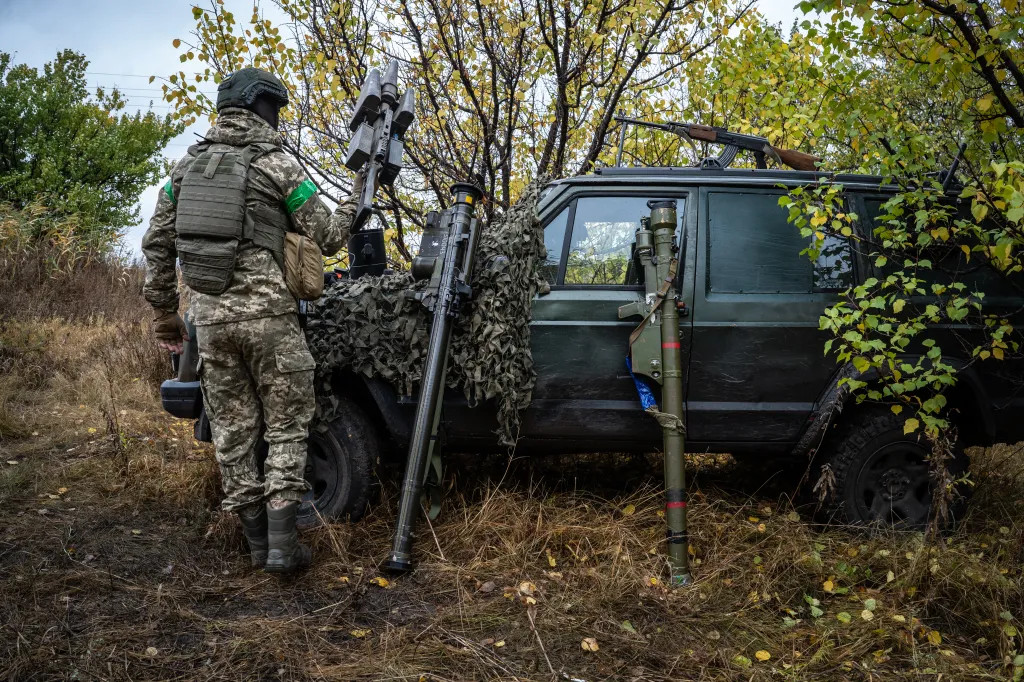
President Volodymyr Zelensky has repeatedly argued that an exchange of land for peace is off the table. However, his congratulatory message contained a sentiment expressed by some in Ukraine that Trump’s leadership style could actually benefit Kyiv.
“I appreciate President Trump’s commitment to the ‘peace through strength’ approach in global affairs,” said Zelensky. “This is exactly the principle that can practically bring just peace in Ukraine closer. I am hopeful that we will put it into action together. We look forward to an era of a strong United States of America under President Trump’s decisive leadership. We rely on continued strong bipartisan support for Ukraine in the United States.”
The prospect of a second Trump administration is not as alarming as some critics have suggested, a former Zelensky administration official recently posited.
“With the announcement of the U.S. presidential election results, social media predictably erupted in drama, particularly concerning Ukraine’s future,” former Zelensky press secretary Iuliia Mendel wrote Wednesday in an opinion piece for the Kyiv Post. “Many experts and journalists have been convinced that Donald Trump’s presidency would spell disaster for Ukraine. However, the reality is far more sober than social media drama: neither candidate offered a clear win for Ukraine.”
Trump’s clearest stance on Ukraine “was his call to end the war,” she continued. “Many interpreted this as a veiled call for capitulation, but the truth is more nuanced. That message resonates deeply with a less vocal group of Ukrainians – those enduring daily bombardments, whose lives have been reduced to an unending cycle of destruction since Russia’s full-scale invasion.”
“A purely military solution has never been a viable path to victory for Ukraine, even with unlimited Western financial and military support,” Mendel argued. “This is not a critique of our armed forces – our soldiers, both professional and civilian, have shown extraordinary bravery and resilience in defending democracy against Russian tyranny. However, we must confront the sobering reality: the cost of this war is steadily eroding the very foundation of the Ukrainian nation.”
The War Zone reached out to some Ukrainians and subject matter experts for their take on what a new Trump presidency will mean for their future. Their responses range from concern that Trump’s previous pro-Putin rhetoric is a sign that he might abandon Ukraine to cautious optimism that he won’t, with the focus being on ending the war.
“Based on what happened in the first Trump administration and all the things that he has said in the past four years, yes, of course, I’d be concerned,” retired three-star general and former commander of U.S. Army Europe Ben Hodges told The War Zone.
“There’s constant praise for Vladimir Putin,” Hodges, one of Ukraine’s staunchest supporters in the U.S., said. “Remember when Putin [launched] the large-scale invasion, Trump said how smart that was. Instead of saying anything positive about Ukraine, he never criticized the Kremlin for what they were doing. So that was the main thing about it that gives me such concern.”
Aside from praising Putin, Trump has repeatedly insulted Zelensky.
On the flip side, there are reasons why Trump would want to keep backing Ukraine, Hodges surmised.
Hodges added that he sees potential for Trump to change his tune. He explained that he hopes pro-Ukrainian Republicans like U.S. Senators Roger Wicker of Mississippi and Lindsey Graham of South Carolina, and U.S. Representatives Mike Turner of Ohio and Joe Wilson of South Carolina can convince Trump to maintain support for Kyiv.
“I think that Mr. Trump has no interest in having the blame for losing Ukraine placed on him. And so I think people that care about Ukraine should appeal to the president to say, ‘look, you’re going to own this,'” Hodges argued. “Nobody in the world believes for one second that Russia will live up to any agreement. And so I think it’s in the interest of the new president to make a very clear statement about how important protecting Ukraine is for civilian security around the world.”
At the moment, Russia does not have the ability to completely overrun Ukraine, said Hodges.
“The only way that happens is if we just quit” backing Ukraine, he suggested.
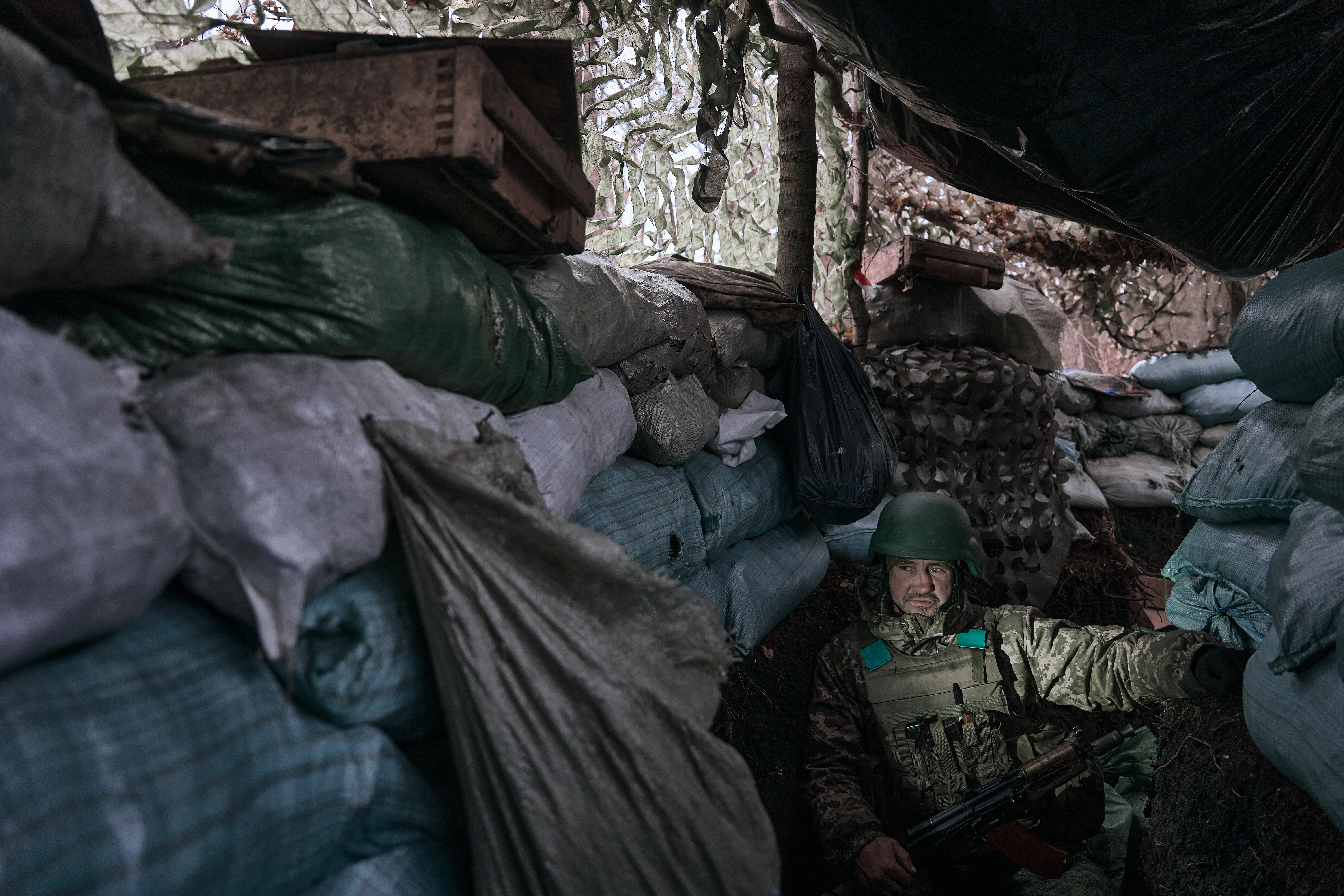
Not everyone in Ukraine is alarmed by another Trump term in the White House.
“Ukrainians are very happy” to see Trump prevail over Democratic Vice President Kamala Harris, Oleksandr V. Danylyuk, chairman of the Center for Defense Reforms and former special advisor to the head of Ukraine’s foreign intelligence service, told The War Zone on Wednesday.
The reason, he stated, is that Trump “will let the Russians understand that the U.S. is going to be great again and is not going to tolerate any attempt to destroy the world order. Either Putin calms down or Ukraine will get everything to finish the job.”
Trump will not be as cautious as Biden when it comes to allowing long-range weapons like U.S.-produced Army Tactical Missile System (ATACMS) short-range ballistic missiles to be fired deep into Russia beyond the border areas, Danylyuk forecasted.
“What is the difference for the U.S. if you are not scared,” he asked rhetorically. “And Trump is definitely not scared.”

Negotiations that would see Ukraine give up land for peace are not new, a Ukrainian political strategist highlighted.
“Let’s be honest, conversations like these have been happening in Washington behind closed doors, without the press, for quite some time,” Kateryna Odarchenko told The War Zone. “I’m not specifically referring to the plan [as described by The Wall Street Journal], but similar concepts have been discussed since the second year of the war. I’m not in a position to say whether this is good or bad at this stage.”
Taking the pulse of how Ukrainians feel about the election results “requires separating the sentiments of political elites from those of the general public,” she added. “Ordinary Ukrainian voters, like voters everywhere, do not deeply analyze geopolitical processes.”
As for the political elites, “they are undoubtedly in a state of caution, leaning more toward negativity than optimism,” explained Odarchenko, a partner in the SIC Group USA and leader of the PolitA Institute for Democracy and Development. “The dialogue with Democrats has been more straightforward in the past. Additionally, during the election campaign, billions were spent not on discussing substantive issues but on message boxes that tend to generalize and polarize, including on topics related to Ukraine.”
Ukrainians “view Americans as friends,” she explained while pointing out that no definitive studies have yet been conducted on the nation’s sentiment toward a new Trump administration. “However, there is also a sense of caution and misunderstanding regarding the Trump administration.”
A new administration only adds to the political headwinds faced by Zelensky, she noted.
“For Zelensky, any scenario is fraught with challenges,” Odarchenko suggested. “Economically, the country was already struggling before the war, but now the situation is even more severe. Furthermore, the mobilized population, after such a prolonged conflict, understandably expects clear answers and a coherent plan for the future — though this is something military experts are better equipped to address.”
Another aspect to consider “is the position of Zelensky’s political opponents, who are largely in a state of waiting rather than actively challenging him,” Odarchenko expressed. “However, any shifts in U.S. or EU policy, or potential negotiations, could lead to their increased activity. At that point, we might see more discussions about internal issues such as the need for reforms — particularly anti-corruption reforms — and other critical topics that could become highly contentious following difficult negotiations.”
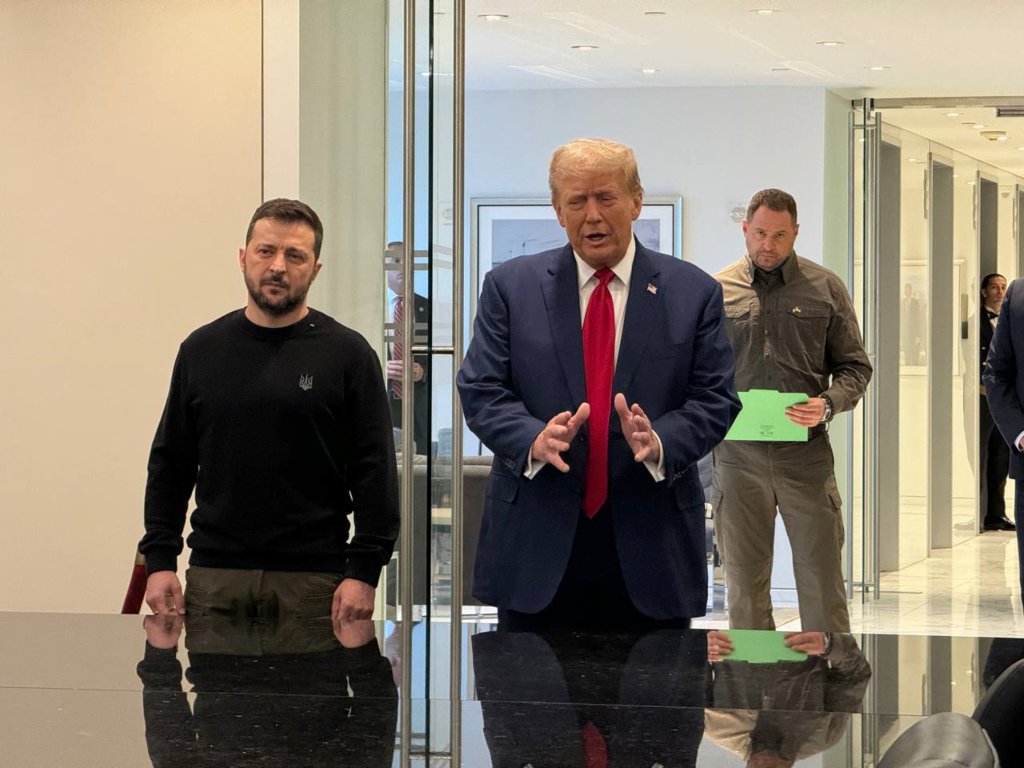
One Ukrainian defense expert we spoke with sees Trump’s election as a positive development.
Trump “will be good for Ukraine,” said the expert, because, “after three years of war, we are not seeing formidable results. The U.S. strategy should be adjusted for the current situation on the battlefield.”
His comments come as Russian forces are pressing forward in the eastern part of Ukraine. Though Moscow is paying a heavy price in manpower and equipment, it also is seeking to recruit an additional 30,000 troops a month. That’s augmented by some 12,000 North Korean troops who are in Russia to help fight Ukraine, a figure that could rise significantly given Pyongyang’s massive army. In an effort to keep pace, Ukraine is looking to draft an additional 160,000 troops into its armed forces, “which will raise the manning of units to 85%,” National Security and Defense Council Secretary Oleksandr Lytvynenko said on Oct. 29 during a session of the Ukrainian parliament.
Still, if the current status quo persists, every day the Russian onslaught continues, Ukraine finds itself in a more precarious state.
“We are in a stalemate, leaning toward Russia, just depleting resources, including human resources,” the expert added. “We have less manpower while Russia has adjusted its economy to produce more weapons. They relocated major supplies like oil and gas and are self-sustainable. Not like Ukraine depends on 75 percent foreign financing.”
A pause in fighting now, he surmised, could ultimately lead to a situation like the one in post-World War II divided Germany, where it took four decades to finally put all the pieces back together and reunify.
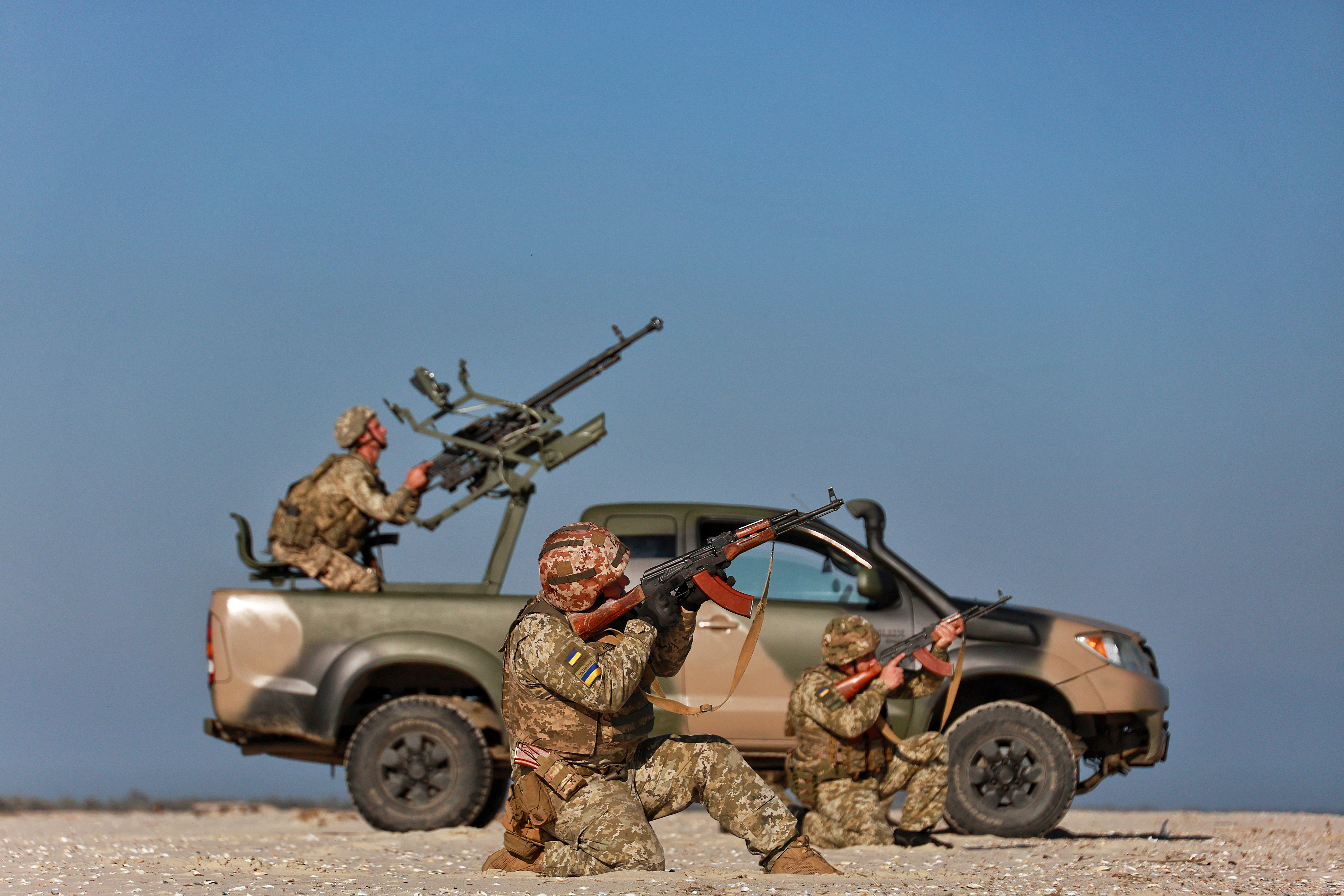
While the Trump administration could drastically reduce the spigot of arms flowing to Ukraine, the expert sees some silver linings. Such a move would pressure European allies to step up and do more. It also opens the door for Ukrainian defense contractors to provide more arms not just domestically, but internationally as well.
Greater reliance on its indigenous industry could be a “win-win,” the expert told us.
“This could be a situation for private industry in Ukraine to earn more money while protecting the motherland,” he said.
Trump has also sparked worry that he could pull out of NATO if its members didn’t increase funding.
Earlier this year, he said he would encourage Russia to do “whatever the hell they want” to any NATO member country that doesn’t meet spending guidelines on defense “in a stunning admission he would not abide by the collective-defense clause at the heart of the alliance if reelected,” CNN reported at the time.
“NATO was busted until I came along,” Trump said at a rally in Conway, South Carolina. “I said, ‘Everybody’s gonna pay.’ They said, ‘Well, if we don’t pay, are you still going to protect us?’ I said, ‘Absolutely not.’ They couldn’t believe the answer.”

Those comments sparked outrage from allies.
“Any attack on NATO will be met with a united and forceful response,” then-NATO Secretary General Jens Stoltenberg said in a statement. “Any suggestion that allies will not defend each other undermines all of our security, including that of the US, and puts American and European soldiers at increased risk.”
European Council President Charles Michel “described comments from Trump on NATO [as] ‘reckless,’ adding they ‘serve only Putin’s interest,'” the network reported.
Still, in his congratulatory message, new NATO Secretary General Mark Rutte praised Trump for pushing NATO allies to spend more on defense.
“President-elect Trump demonstrated strong U.S. leadership throughout his first term in office – a term that turned the tide on European defense spending, improved transatlantic burden sharing, and strengthened Alliance capabilities,” Rutte wrote. “When President-elect Trump takes office again on January 20, he will be welcomed by a stronger, larger, and more united Alliance. Two-thirds of Allies now spend at least 2% of their GDP on defense, and defense spending and production are on an onward trajectory across the Alliance.”
However, he has also pointed out that an undeterred Russia that wins in Ukraine is a massive threat to NATO members.
“If Russia would be successful in Ukraine, you would have an emboldened Russia at our border…,” he recently told reporters.

Likewise, Poland’s Foreign Affairs Minister noted the importance of European allies doing more to support Ukraine and themselves.
“The American people have voted,” Radek Sikorski stated. “I am in regular contact with top security officials from both parties. Europe urgently needs to take more responsibility for its security. The winds of history are blowing ever more strongly. Poland’s leadership will rise to the occasion.”
As for the Russians, opinions about Trump returning to the White House range from concern he might end restrictions on donated weapons to shrugs of indifference to crowing that this is a huge victory for Russia.
Russian President Vladimir Putin on Thursday congratulated Trump, saying he welcomed the chance for warmer relations.
“What has been said about the desire to restore relations with Russia, to help bring the Ukrainian crisis to an end, I think that’s worthy of attention, at the very least,” he stated. “And I would like to take the opportunity to congratulate him on his election as president of the United States.”
Putin is open to talking directly to Trump, but the Russian leader would not make the first move, Kremlin press secretary Dmitry Peskov said on Telegram Thursday.
Russian parliamentarians don’t see much change in the wind.
“I think that Trump will offer Russia a deliberately unfavorable deal on Ukraine before January, which we will, of course, reject,” said Russian member of parliament Yevgeny Popov. “Donald will throw up his hands and, in his usual manner, announce an unprecedented aid package for the Zelensky regime and the lifting of all restrictions on missiles. This will not change anything either. But it will delay the settlement process. Glory to the Russian soldier!”
Konstantin Kosachev, deputy speaker of Russia’s upper house of parliament, also expressed doubt that Trump will offer a dramatic departure from Biden when it comes to bilateral relations.
“It would be extremely naive to believe that under Trump, as he promises, peace in Ukraine will suddenly become closer,” he proclaimed on Telegram. “The Ukrainian conflict has only one simple solution – Russia’s victory, which the U.S. will not want under any president. The other solutions are complex, although the U.S. can indeed influence them, since the Kyivv – and Brussels – regimes depend on them.”
Meanwhile, Russian propagandist Alexander Dugin declared Trump’s election a victory for Russia.
“So we have won,” he said on Twitter. “That is decisive. The world will be never ever like before. Globalists have lost their final combat. The future is finally open. I am really happy.”
A lot will change over the next few months. Trump will select a new defense secretary and a new national security advisor among his other cabinet choices. We should also see more clarity about exactly what the proposed peace treaty espoused by the soon-to-be 47th president will entail. Having majorities in both the Senate and House will make whatever agenda he chooses easier to become reality.
Still, a deal with Russia may be far more difficult than Trump envisions. There are major concerns that Trump will hold out aid to Ukraine unless it agrees to a deal it does not want to make. And then there is also the issue of where the U.S. relationship with NATO would go if Trump decides to stop supporting Ukraine’s fight for whatever reason. A major fissure could form as a result after the alliance has come together in its support of Ukraine to a degree many thought was impossible.
Above all else, if a peace deal isn’t realized, the question of what happens next is arguably is the most glaring concern. So far Trump has not addressed that very real possibility.
Contact the author: howard@thewarzone.com
